- Home
- Peter Ackroyd
The Casebook of Victor Frankenstein Page 7
The Casebook of Victor Frankenstein Read online
Page 7
“What are you sewing?”
“It is for you. A Geneva purse.” This was the name given to the small, elaborately tapestried purses that the merchants of the region employed. “I am stitching the image of Papa into it. It will be a keepsake for you during your travels.”
“I would prefer to keep an image of you, Elizabeth.”
“Oh, I am not as I was.” She looked over the lake towards the mountains. “At least I will not grow old.”
“Please do not say-”
She looked at me again intently. In her emaciated face I thought I could see some vision of the old age she would not reach. “I am not afraid of the truth, Victor. My sun is low in the sky. I know it.”
“You will recover here. They have remedies for your malady.”
“It is called consumption of the lungs. It is a good word. I am being consumed.” I was about to say some word of consolation, but she put up her hand. “No. I am prepared for it. I count it the greatest good fortune that I can sit here beside our beloved lake. You know it speaks to me?” She had a sudden bout of coughing, anguished and prolonged. I wanted to take her in my arms and comfort her, but I believe that she did not wish for consolation. “It is cheerful enough. It reminds me of all the happiness I have known. It tells me of your great adventures in England.”
“What else?”
“It speaks to me of peace.”
“ Elizabeth.” I bowed my head.
“No need for tears, Victor. I am quite happy. Sometimes I sit here at night-”
“Do the doctors permit it?”
“I slip away. They allow us to sleep undisturbed, and I always return before the break of day. So I sit here in the darkness and look over the water. Some of the boats carry oil-lamps, and at night they are like little pieces of glowing fire floating before me. It is very exhilarating. I often think death must be like that-gazing at distant lights. Oh, here comes Papa.”
Our father was walking over the lawn towards us. He was formally dressed, with a dark green frock-coat and cravat, but his rapid stride suggested his unease. “Victor, you should have called upon me.”
“I arrived in Geneva late last night, Papa. There was no time. Did you not get the letter I sent from Oxford?”
“I have received nothing.” I knew that he was greatly agitated by the sight of Elizabeth: it was clear to me that her condition was declining day by day. “I have not been attending to business in Geneva. Have you eaten today, Elizabeth?”
“Some bread steeped in milk, Papa.”
“You must eat.” He put his hands upon her head, as if he were trying to bestow some blessing upon her. “You must grow stronger. Did you sleep well?”
“Of course.”
“Good. Food and rest. Food and rest.” He bent down, and rearranged the shawl around her shoulders. “The wind comes directly from the mountains, Elizabeth. May I suggest that you return to your room?”
“The doctors extol the advantages of the open air, Papa.”
“That is all very well. But do you see them sitting by the lake? I feel the chill myself. Victor, help me with your sister.”
“I am quite able to walk, Papa.”
“Of course you are, Elizabeth. We will walk beside you. Victor, will you take your sister’s arm?” When she rose from the wicker bench, I realised that she was very frail; she seemed to sway slightly in the wind, and for a moment I thought that she had lost her balance. She leaned against me and laughed: it was as if she were laughing at her own incapacity.
There was a slight incline towards the sanatorium, and she grasped my arm as we slowly climbed the gravel path that led away from the lake. Our father walked on the grass beside us, his head lowered in contemplation, but when we reached the door of the building he went ahead of us. He told me afterwards that he had wished to speak to one of Elizabeth ’s doctors, away from her presence; and so I escorted her back to her room.
“Papa is very sad,” she said. “I rely upon you to comfort him.”
“How should I do that?”
“I am not sure.”
“I cannot stay here, Elizabeth. I cannot live in Geneva.”
“I know that. This is no place for you. You have always been fired by ambition.”
“I cannot apologise for that.”
“I expect no such thing. It is laudable. I have always been proud of you, Victor. I have watched you with admiration ever since you were a small boy. Do you remember how you showed me the chicken’s life in the hen’s egg? You had observed it. You made yourself the master of anything you wished to know.” Elizabeth became more animated as she spoke, as if she were reliving the days before her illness. “You pestered people with questions for which they had no answers. Why did clouds change their shape? Why did the cut worm divide into two lives? Why did the leaves change colour in the autumn?” She broke off. “Excel in your studies, Victor. Become a great personage.”
Papa came into the room with a young man who greeted Elizabeth in the most informal manner possible. I took him to be one of her doctors, but I did not like him. “ Elizabeth,” he said, “is the most patient subject. She has been cupped and blistered without the least complaint.”
“I am glad to hear it,” Papa replied. “And she is eating well?”
“She keeps up her strength. We have nothing but the highest hopes.”
This seemed to me to be a little piece of theatre contrived for Elizabeth ’s sake, but her expression of weariness convinced me that she had not been impressed by it. “I think we should leave you now,” I said. “You are tired.”
“Yes,” Papa said. “She must rest. Rest is the cure.”
“May I admit to being tired?” She glanced at the doctor, who had been observing her keenly.
“Of course. Don’t forget there is a recital on the pianoforte before supper. We will be listening to Mozart.”
“I do not like to listen to music any more.”
My father embraced her before we left, once more urging her to eat well and to sleep. I doubted that she would obey his instructions. She was too far out of the world to care for such things. As soon as we had left her, his eyes filled with tears. I had never seen him cry before. “She cannot live,” he said. “The doctor knows it.”
“Surely there is some hope?”
“None whatever. The doctors have said that there can be no remission. The consumption has taken over her lungs.”
“But doctors can be mistaken.”
“Did you hear her breathing? The doctor told me that last night her mouth was filled with arterial blood.”
“What shall we do?”
“We shall wait. What else is there to do?”
“The sun will no longer warm her.”
“What was that?” I had spoken too softly for him to hear me.
“This is a hard time, Papa.”
“It will become harder. We must cherish your sister.”
ELIZABETH ’S DEATH OCCURRED two days later. She was found in the morning, sitting in a chair by her bed. It was said that she had suffered no pain, but how that was determined I do not know. My father insisted that she be buried in the little graveyard at Chamonix, the village where the family house was situated. So Elizabeth was placed in a lead coffin, and together with her we travelled on the winding road out of Geneva towards the mountains. I do not need to state that this was a melancholy journey. All I recall of it now was the scent of sweet logs burning that accompanied us for part of the way.
When we reached our old home, I longed to see once more the pure whiteness of the snow, which no one on earth had touched. From the window of my room I could see Mont Blanc, and the summit known to us as l’Aguille du Midi; the snow upon the upper reaches was brilliantly illuminated by the sun, while the rest of the mountain was still caught in shadow with the grey snow and the slopes of the trees cascading into the valley. There was nothing there to limit the range of the gaze. I could see pockets of stone which no light had ever reached, the paths of rivers that
would never flow, the rocks hewn into strange shapes by forces I could not fathom, all draped in eternal quiet. It was the quiet that Elizabeth had now entered. But then loud birdsong called me back to earth.
In the evening before the funeral the storm came. Thick clouds covered the mountains, and obscured their summits with lowering grey mist. Small patches of sunlight touched the ground and, when the wind stirred, the leaves of the trees quivered like violins. When the lightning hit the mountainside, it was like a rod beating the ground. The fire came from various regions of the sky; the thunder changed direction, too, and seemed to be travelling beneath the mountains. Then no mountains were visible. The air was heavy with expectation, with the perfume of the lightning upon it. But I saw, on the grass commons, a young girl playing with two small dogs. I wished Elizabeth back again then, to see this with me. If I could bring her alive again, I would! My unspoken thought chimed with the lightning flash in a moment of identity.
WHEN THE BELLS OF THE LITTLE CHURCH at Chamonix rang, as she was laid within the soil, they seemed to reverberate among the rocks and snow. I was once more filled with a sensation of childhood-that, somehow, the bells were inside the mountain pealing through its depths.
After the funeral, which was attended by most of the villagers of Chamonix, I could not rest. I could not stay still. And so I returned to the mountains. I began climbing upwards through the forests of fir trees that flanked the lower reaches, struggling to keep my foothold among the rocks and roots that continually impeded my ascent; there were small streams here, too, falling precipitately from the glaciers on the upper reaches, but eventually I found the winding track used by the peasants of the region. I wanted to climb higher and still higher, to stand upon l’Aiguille du Midi. I could hear the cry of a marmotte somewhere close by, and in its piercing call I realised the loneliness of my position. If I fell here, and died, my body would soon be covered in ice and snow; it might endure for many generations as a relic of my time, as the modern experiments in freezing suggest that it would not decompose.
The air was thinner here, and I could sense the blood pulsing through my body. It was a glorious sensation, to feel the force of life, but in this vast solitude with the currents of the world circling about me it also induced a feeling akin to terror-to be aware of the power of existence, and at the same time to understand its frailty. I lay down on the frozen earth but I had no sensation of cold. I called out to the marmotte with an imitation of its cry. The creature responded with a more plaintive note, as if he were unsure of the greeting. I called again, with the utmost certainty that all life is one, and the marmotte replied with a thrilling sound of recognition.
AFTER THE DEATH OF ELIZABETH my father seemed to weary of his own life; he grew old very rapidly, and took no more interest in the export business he had created over many years. He refused to go back to Geneva, and locked himself away in his study at Chamonix where he sat from dawn to twilight looking out of the window at the mountains. He joined me at dinner in the evenings, but there was little conversation. There were times, however, when he spoke from a full and overburdened heart. “You are a student of the sciences,” he said to me one evening. “Can you tell me why the meanest creature possesses life, and Elizabeth has no life at all?”
“It is not a perpetual gift, Father.”
“This moth,” he said, “is filled with life. Do you see how it circles around the candle flame? Do you believe that it enjoys its existence?”
“It seems to dance, Father. All living creatures must exert their energy.”
“Yet this life, this enjoyment, cannot last.”
“The moth does not know of death.”
“So it believes itself to be immortal?”
“The concept of immortality does not occur. It is. That is enough. It does not live in time.”
“This power of existence that it possesses-could it be found?”
“What do you mean?”
“Is there some essence, some vital spark?”
“That is not a question I can answer, Father. It has been the subject of much debate, but with no very satisfactory conclusion.”
“So we do not know what life is.”
“It cannot be defined. No.”
“What is the use of all your sciences and studies if the essential thing is not understood?”
“We can only proceed from the known to the unknown.”
“But when the unknown is so great-”
“It excites my efforts even more, Father.” The moth was still fluttering around the candle, and I caught it in my cupped hands; I could feel its pale wings beating against the skin of my palms, and I experienced a sensation of sudden elation. “I am in pursuit of that spirit of life.”
“And what do your professors at Oxford think of it?”
“Oh, they do not know of it.” Instantly I regretted my quick reply.
“It is a secret pursuit, then?”
“Not secret. Many other men are engaged upon it. We work independently towards the same goal.”
“This is a good century in which to live, is it?”
“Of course.” I opened my hands, and the moth fluttered uncertainly into the dusky air. “There will be great discoveries. We will uncover the secrets of the electrical fluid. We will build great cathedrals of voltaic batteries so that we can re-create the lightning.”
“And create life?”
“Who knows? Who can tell? It may come too late for me.”
“You have always been very determined, Victor. I believe that you will always succeed in whatever task you set for yourself. What do you wish for?”
“I wish to bring Elizabeth back into life.”
He bowed his head, but he was alerted suddenly by a faint rumble in the mountains behind us. “Avalanche,” he said. “Now if you could master those, Victor, you would be celebrated.” And then he sighed.
A FEW WEEKS AFTER THE FUNERAL he contracted influenza, and weakened daily. It was a lesson to me in the governance of the body by the mind. The life force was mental and spiritual as well as physical, and as soon as my father despaired of life his vital powers began to fail. He would not take to his bed but remained in the armchair in his study. He had such an affection for his books that I believe he did not want to leave them. He never spoke of the business that he had entrusted to his confidential clerk, M. Fabre. Indeed, he never spoke of anything coherently or for very long. “Use the money to advantage,” he said to me one evening, at a time when I believed him to be asleep. “Use it for good.” I was his sole heir, and quite aware of the financial responsibilities that would devolve upon me. “Whatever is human, you can accomplish.” Then he lapsed back into silence.
I was sitting beside him when he died. I had been reading to him from Goethe’s The Sorrows of Young Werther, a novel which I had always intended to study with all the more enthusiasm since it had been extolled to me by Bysshe. My father had an excellent knowledge of German, but I am not sure that he understood or was even listening to my words; I simply wished to reassure him of my presence. Suddenly he opened his eyes. “It is not that Werther loved too much,” he said. “He lived too long.” And then he slipped away.
I had expected some change at the moment of death, some sense of departure, but not of the kind I witnessed. It was as if his life had never been; it was as if he had reverted to some previous state, before life had infused him. He had gone back. I felt his pulse, and the side of his neck, but all had gone.
SO ANOTHER FRANKENSTEIN WAS BURIED in the hill behind the little church at Chamonix; I was the only mourner of my immediate family, but I was followed to the grave by the servants of the household as well as the employees of my father’s business and by the same villagers who had attended Elizabeth’s funeral. I wept freely-but perhaps I was weeping for myself.
I remained in Switzerland for two months, during which period I put my affairs in order and relinquished the administration of the company to M. Fabre who had always been trusted by my father. I
had written to the Master of my college in Oxford, explaining the reasons for my delay and asking him for leave of absence until the following term; this was permitted, under the statutes, and I looked forward to returning to my studies with redoubled zeal and ambition. I was now the heir to a large fortune, which I could employ without check or scrutiny, and I had already determined to devote it to my pursuits in the science of life.
I was happy to return for other reasons. I had heard nothing of Bysshe for several months, and I was eager to learn of all his exploits in London. Now I contemplated the notion of renting a commodious house in the city, where he and I could live in close intercourse. I had other schemes, drawn up in my mind’s eye with as much fidelity as if I sat with an architect beside me. I planned to create a great laboratory, where I could engage in experiments on the largest possible scale. I wished to build a “gallery of life” where all the emerging forms of primitive existence could be displayed. In truth, I wished to become a benefactor of mankind. So, in the early autumn of that eventful year, I returned with enthusiasm and anticipation to England. I believed that in London a man with sovereigns in his pocket is master of his destiny. In this, however, I was to be proved mistaken.
7
WHEN I ARRIVED IN LONDON I rented rooms in Jermyn Street, but took the precaution of having my heavy luggage sent before me to Oxford. I had scarcely swallowed down a plate of beef, in the chop-house next to St. James’s church, when I made my way to Poland Street. The windows of Bysshe’s old lodging were closed, and so I mounted the stairs and rapped upon the door with the ivory cane I had brought with me from Switzerland. A young woman came to the door, nursing a small infant. I was at a loss for words in that instant, and simply stared at her.
“Yes, sir?”
“Mr. Shelley?”
“I beg your pardon?”
“Is Mr. Shelley here?”
“No one of that name.”
“Percy Bysshe Shelley?”

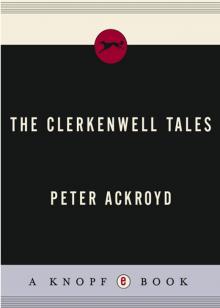 The Clerkenwell Tales
The Clerkenwell Tales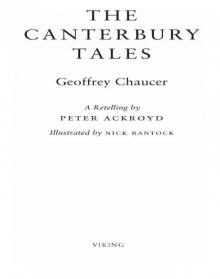 The Canterbury Tales
The Canterbury Tales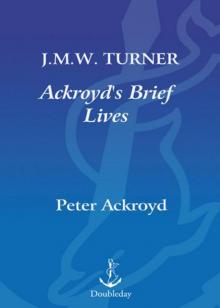 J. M. W. Turner
J. M. W. Turner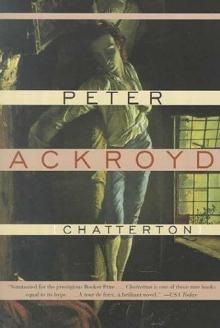 Chatterton
Chatterton The Canterbury Tales – A Retelling
The Canterbury Tales – A Retelling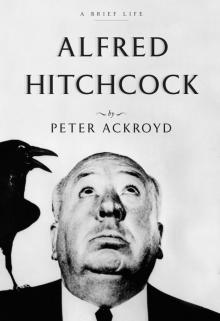 Alfred Hitchcock
Alfred Hitchcock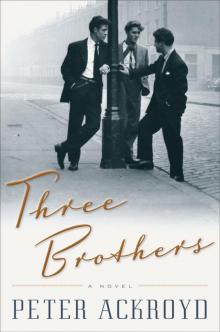 Three Brothers
Three Brothers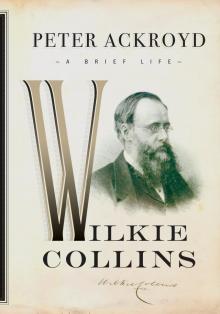 Wilkie Collins
Wilkie Collins Venice
Venice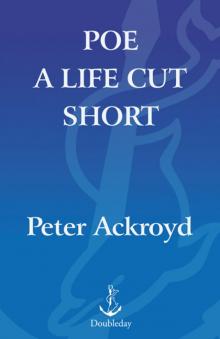 Poe
Poe The Lambs of London
The Lambs of London London
London Queer City
Queer City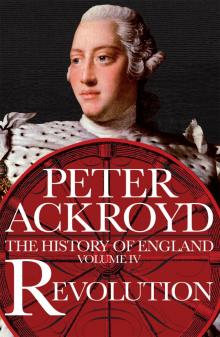 Revolution, a History of England, Volume 4
Revolution, a History of England, Volume 4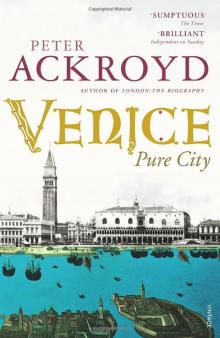 Venice: Pure City
Venice: Pure City Foundation
Foundation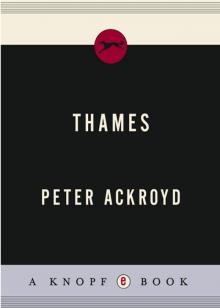 Thames
Thames The Plato Papers
The Plato Papers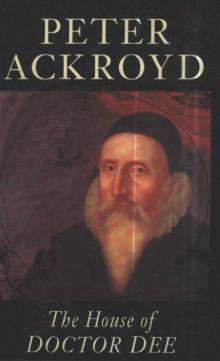 The house of Doctor Dee
The house of Doctor Dee Rebellion: The History of England from James I to the Glorious Revolution
Rebellion: The History of England from James I to the Glorious Revolution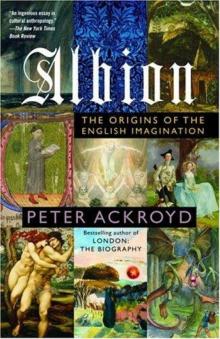 Albion: The Origins of the English Imagination
Albion: The Origins of the English Imagination The Fall of Troy
The Fall of Troy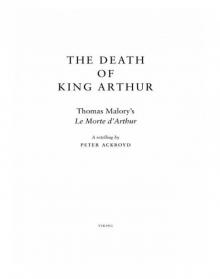 The Death of King Arthur
The Death of King Arthur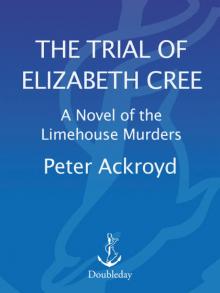 The Trial of Elizabeth Cree
The Trial of Elizabeth Cree London: The Biography
London: The Biography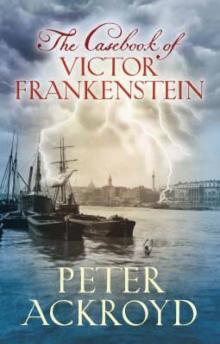 The Casebook of Victor Frankenstein
The Casebook of Victor Frankenstein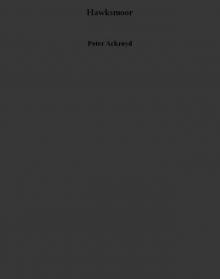 Hawksmoor
Hawksmoor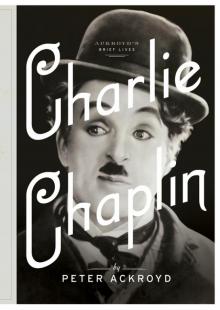 Charlie Chaplin
Charlie Chaplin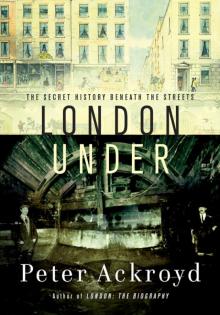 London Under
London Under